牛津译林版七年级上册(新)英语导学案:Unit 4 My Day
牛津译林版七年级上册Unit4《Myday》(第6课时)说课稿

牛津译林版七年级上册Unit 4《My day》(第6课时)说课稿一. 教材分析《牛津译林版七年级上册Unit 4 My day》第6课时,主要讲述了一天中的活动以及表达自己一天中的安排。
通过本课时学习,学生能够掌握一般现在时态的运用,学会如何用英语描述自己一天的活动。
教材内容丰富,贴近学生生活,有助于激发学生学习兴趣,提高学生英语运用能力。
二. 学情分析七年级的学生已经掌握了基本的英语语法知识,对一般现在时态有所了解。
但部分学生对英语表达仍存在一定的困难,特别是在描述自己一天的活动方面。
因此,在教学过程中,需要关注学生的个体差异,引导他们积极参与课堂活动,提高他们的英语表达能力。
三. 说教学目标1.知识目标:学生能够掌握一般现在时态的运用,学会用英语描述自己一天的活动。
2.能力目标:通过听力、口语、阅读和写作等实践活动,提高学生的英语运用能力。
3.情感目标:培养学生热爱生活、珍惜时间的态度,养成良好的学习习惯。
四. 说教学重难点1.教学重点:一般现在时态的运用,描述自己一天的活动。
2.教学难点:如何引导学生运用所学知识,真实地描述自己的一天,提高英语表达能力。
五. 说教学方法与手段1.任务型教学法:通过设定各种任务,让学生在完成任务的过程中,自然地学习和运用英语。
2.情境教学法:创设生活情境,让学生在真实的环境中,学会用英语描述自己的一天。
3.小组合作学习:鼓励学生互相交流、讨论,提高课堂参与度,培养学生团队合作精神。
4.多媒体辅助教学:利用课件、视频等资源,丰富教学手段,提高学生学习兴趣。
1.热身(5分钟):通过提问学生一天的活动,引导学生回顾已学知识,为新课学习做好铺垫。
2.呈现(10分钟):利用课件展示一天的活动图片,引导学生用英语描述图片内容,引出本课主题。
3.任务型学习(15分钟):学生分组,每组完成一个描述自己一天活动的任务,如制作海报、编写故事等。
4.口语练习(10分钟):学生模拟情景,用英语描述自己的一天,培养口语表达能力。
Unit4My day Task教案 牛津译林版七年级上册英语
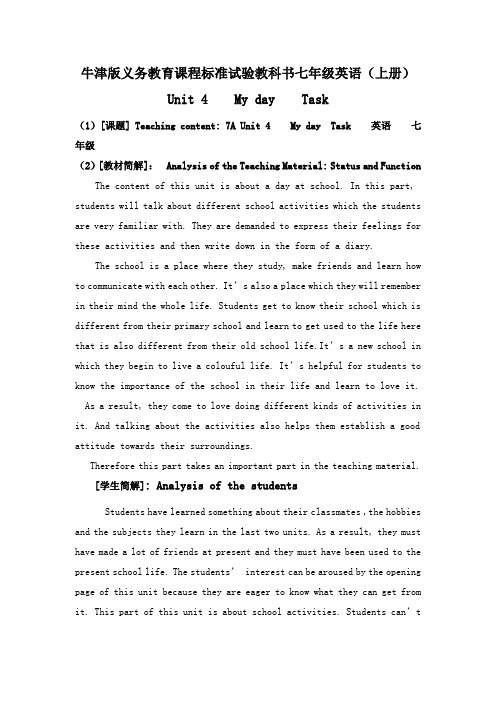
牛津版义务教育课程标准试验教科书七年级英语(上册)Unit 4 My day Task(1)[课题] Teaching content: 7A Unit 4 My day Task 英语七年级(2)[教材简解]:Analysis of the Teaching Material: Status and Function The content of this unit is about a day at school. In this part, students will talk about different school activities which the students are very familiar with. They are demanded to express their feelings for these activities and then write down in the form of a diary.The school is a place where they study, make friends and learn how to communicate with each other. It’s also a place which they will remember in their mind the whole life. Students get to know their school which is different from their primary school and learn to get used to the life here that is also different from their old school life.It’s a new school in which they begin to live a colouful life. It’s helpful for students to know the importance of the school in their life and learn to love it. As a result, they come to love doing different kinds of activities in it. And talking about the activities also helps them establish a good attitude towards their surroundings.Therefore this part takes an important part in the teaching material.[学生简解]: Analysis of the studentsStudents have learned something about their classmates ,the hobbies and the subjects they learn in the last two units. As a result, they must have made a lot of friends at present and they must have been used to the present school life. The students’ interest can be aroused by the opening page of this unit because they are eager to know what they can get from it. This part of this unit is about school activities. Students can’twait to talk about these activities and their feelings for them to eachother .(3)[目标预设]:Teaching Aims:1. The aims of the knowledge :1) Key words:reason, ready, learn, world, dislikeKey Phrases: get ready forKey sentence patterns:I like /love/dislike/don’like/hate sb. (sth. )My favourite…is…I can learn a lot about…It helps me...2) To grasp the usage of some important expressions2. The aims of the abilities1) To learn to express one’s likes and dislikes and the reasons.2)To write an article telling others about one’s personal likes, dislikes and the reasons.3. The aims of the emotionsGet to know how to plan the time properly and love the school lif (4)[重点、难点]:The teaching focuses and the difficulties●To discuss likes and dislikes.●To write a passage on the base of your chart.(5)[设计理念]The design concept贯彻落实“以学定教,学教相长”的教学理念,以充分借助于多媒体技术来创设情境、设置任务为主线优化课堂教学模式,抓住写作训练这条主线。
牛津译林版英语七年级上册Unit 4 My day Reading 1 School life
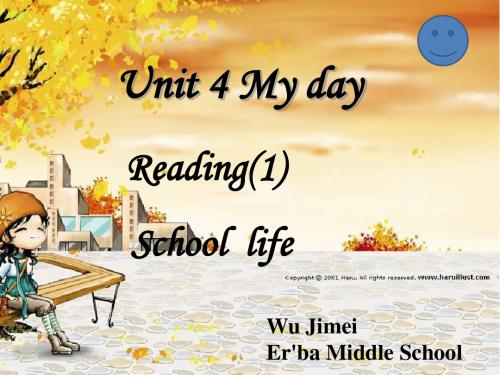
1.Talk about your school life with your friends
2.Read Millie's email flunently and remember the new words and phrases.
She _g__o_e_s__t_o_t_h_e__l_ib_r_a_r_yin the afternoon with
Yohuerrffrriieennddss.at school They often read books in Reading Club on
_T_u_e_s_d__a_y__a_n_d__T_h. ursday She is __in__t_h_e__s_c_h_o_o__l _v_o_l_le_y_b__a_ll__te_a__m_ and _p_ra__c_ti_c_e_s_ after school on Wednesday afternoon.
chat with each other
/tʃæt/
4.00p.m.
after-school activities
practise playing volleyball
/ˈpræktɪs/
drawing club
have a good time
Millie
Tommy
Millie’s school life
Unit 4 My day
Reading(1) School life
Wu Jimei Er'ba Middle School
My school
【原创导学案】2015-2016学年七年级英语牛津译林版上册:Unit 4 My day Speak up Study skills
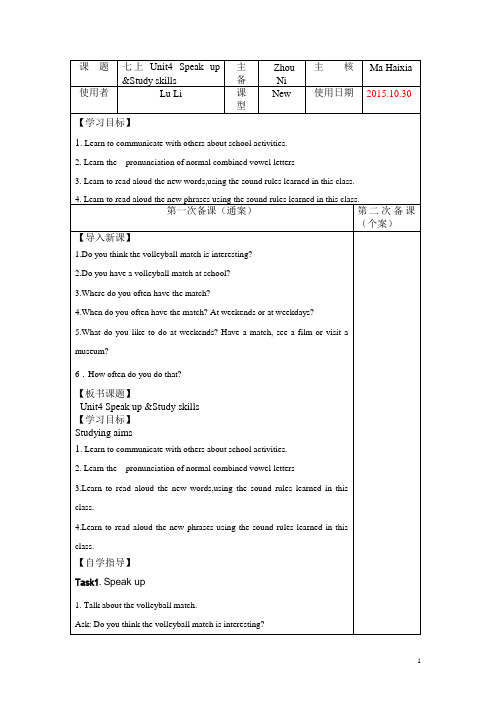
课题七上Unit4 Speak up&Study skills 主备ZhouNi主核Ma Haixia使用者Lu Li 课型New 使用日期2015.10.30 【学习目标】1. Learn to communicate with others about school activities.2. Learn the pronunciation of normal combined vowel letters3. Learn to read aloud the new words,using the sound rules learned in this class.4. Learn to read aloud the new phrases using the sound rules learned in this class.第一次备课(通案)第二次备课(个案)【导入新课】1.Do you think the volleyball match is interesting?2.Do you have a volleyball match at school?3.Where do you often have the match?4.When do you often have the match? At weekends or at weekdays?5.What do you like to do at weekends? Have a match, see a film or visit amuseum?6.How often do you do that?【板书课题】Unit4 Speak up &Study skills【学习目标】Studying aims1. Learn to communicate with others about school activities.2. Learn the pronunciation of normal combined vowel letters3.Learn to read aloud the new words,using the sound rules learned in thisclass.4.Learn to read aloud the new phrases using the sound rules learned in thisclass.【自学指导】Task1. Speak up1. Talk about the volleyball match.Ask: Do you think the volleyball match is interesting?Do you have a volleyball match at school?Where do you often have the match?When do you often have the match? At weekends or at weekdays?2. Go on talking with the studentsAsk: What do you like to do at weekends? Have a match, see a film or visit a museum?How often do you do that?(活动方式:师生交流——小组交流——小组汇报)3. Listen to Part B and answer the question:What does Tommy often do at weekends?4. Read the dialogue after the tape.5. Practise and act the dialogue in pairs.(活动方式:小组合作——小组汇报)Task 2.Revision and lead-inWarming up by saying tongue twisters.T: Do you like tongue twisters? I have two here. Would you like to have a try to read them?Mr. Cook says to a coo k, ”L ook at the book. It is very good.Dr Keep says to a keeper,” Look after the tiger. It’s very clever.(活动方式:小组合作——小组汇报)T ask3.PresentationRead a poemGood weather, bright star.Father Horn is in his star.Shakes head, plays the guitar.With Dog Ball goes far.(活动方式:小组合作——小组汇报)Task4.PracticeVowels(III)1.Read the following words and pay attention to the sounds of the vowels. Answer the questions in pairs.Listen to Part B and answer the questionPractise and act the dialogue in pairs.学生活动指导:Pay attention to the vowel letters in these words,how to read them?小组活动指导:To make the stude nts realize the five vowelarm—art—car—star------------------ /a:/tall---walk—horse—short----------- /ɔ:/eat—read—meet—see---------------------/i:/ bread—head—heavy—weather---------- /e/ cool—food—moon—school-------------- /u:/ book—good—look—would------------- /u/bird—girl—nurse—word---------------- /ə:/ after—dinner—father—worker---------- /ə/(活动方式:独自回答——小组校对、讨论——小组汇报)Task5.Show timeReading1. Read the words in Part A and put each of them in the correct place.2. Read the words on the left of Part B first, then try to say the words on the right correctly.3. Read the phrases in Part C(活动方式:小组讨论——组内互查、纠错——个人汇报)Task 6.ConsolidationWhat have you learned in this class? Do you have any questions to ask?【堂清知识】根据所给提示,完成下列句子。
牛津译林版英语七上Unit4《Myday》(Grammar)说课稿

牛津译林版英语七上Unit 4《My day》(Grammar)说课稿一. 教材分析《牛津译林版英语七上Unit 4 My day》主要讲述了日常生活中的活动安排和描述。
通过本单元的学习,学生能够掌握一般现在时态的运用,学会如何用英语描述自己的日常活动。
本单元的核心语法是一般现在时,学生需要掌握其构成、用法以及与一般过去时和一般将来时的区别。
二. 学情分析七年级的学生已经初步掌握了英语的基础知识,具备一定的听、说、读、写能力。
但在此阶段,学生对英语的语法知识掌握还不够深入,需要通过大量的练习来巩固。
此外,学生的学习兴趣和积极性对英语学习成果有很大影响,因此,激发学生的学习兴趣和动机是本节课的重要任务。
三. 说教学目标1.知识目标:学生能够掌握一般现在时的构成、用法,学会用英语描述自己的日常活动。
2.能力目标:学生能够在实际情景中运用一般现在时,提高英语表达能力。
3.情感目标:培养学生热爱生活、积极向上的生活态度,增强同学间的友谊。
四. 说教学重难点1.教学重点:一般现在时的构成、用法以及与一般过去时、一般将来时的区别。
2.教学难点:一般现在时的运用,特别是在具体情境中的运用。
五. 说教学方法与手段本节课采用任务型教学法,通过各种互动活动,让学生在实际操作中掌握一般现在时的用法。
同时,运用多媒体手段,如图片、视频等,辅助教学,提高学生的学习兴趣。
六. 说教学过程1.导入:以一幅描绘日常活动的图片引导学生进行观察,激发学生对课程的兴趣。
2.呈现:通过展示一段视频,让学生了解一般现在时的用法,同时引入本节课的主题。
3.操练:设计各种任务,让学生在实际操作中运用一般现在时,如描述自己的日常活动、编写对话等。
4.巩固:通过小组活动,让学生在互动中进一步巩固一般现在时的用法。
5.拓展:引导学生运用一般现在时描述未来的计划,培养学生的创新思维。
6.总结:对本节课的内容进行归纳总结,强调一般现在时的用法。
7.作业:布置相关练习,让学生课后巩固所学知识。
牛津译林版英语七上Unit4《Myday》(welcome)说课稿

牛津译林版英语七上Unit 4《My day》(welcome)说课稿一. 教材分析牛津译林版英语七上Unit 4《My day》(welcome)的话题是关于日常生活的,通过学习本单元,学生可以掌握关于日常活动的一些词汇和表达方式,如go to school, have lunch, do homework等。
同时,学生还可以学会如何用英语描述自己的日常生活。
本节课的主要内容是学习一般现在时,并通过谈论日常活动来运用一般现在时。
二. 学情分析七年级的学生已经掌握了一些基本的英语语法和词汇,但对一般现在时的理解和运用还不够熟练。
因此,在教学过程中,需要引导学生通过观察、实践和交流来理解和运用一般现在时。
此外,学生对日常活动的表达方式还不够熟悉,需要通过大量的练习和互动来提高他们的表达能力和合作能力。
三. 说教学目标1.知识目标:学生能够掌握关于日常活动的一般现在时的表达方式,如go to school, have lunch, do homework等。
2.能力目标:学生能够在适当的语境中运用一般现在时描述自己的日常生活,提高他们的语言运用能力。
3.情感目标:通过谈论日常生活,培养学生热爱生活、积极向上的态度。
四. 说教学重难点1.重点:学生能够掌握一般现在时的基本结构和用法。
2.难点:学生能够灵活运用一般现在时描述自己的日常生活,并在实际情景中进行交流。
五. 说教学方法与手段1.教学方法:采用任务型教学法,让学生在完成任务的过程中学习和运用语言。
2.教学手段:利用多媒体课件、图片、卡片等辅助教学,提高学生的学习兴趣和参与度。
六. 说教学过程1.导入:通过展示一张自己的日常照片,引导学生谈论自己的日常生活,激发学生的学习兴趣。
2.新课呈现:通过多媒体课件展示一般现在时的结构,引导学生观察和理解一般现在时的用法。
3.学习活动:学生分组进行角色扮演,用一般现在时描述自己的日常生活,如起床、上学、吃饭等。
牛津译林版七年级英语上册《nit 4 My day Grammar: Prepositions of time . 》赛课导学案_9
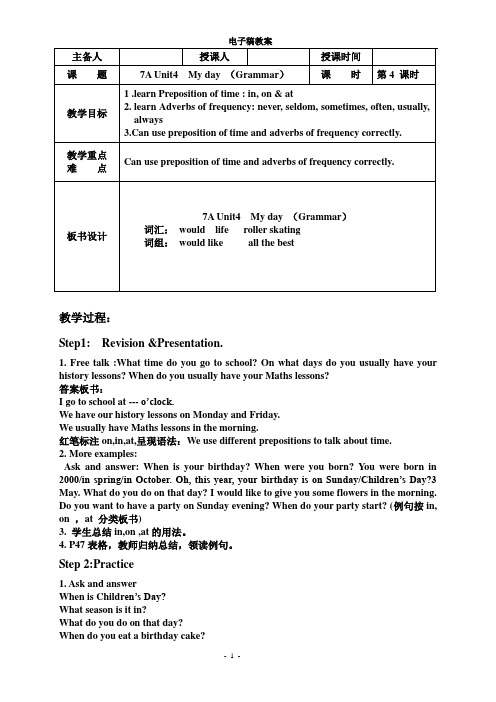
教学过程:Step1: Revision &Presentation.1. Free talk :What time do you go to school? On what days do you usually have your history lessons? When do you usually have your Maths lessons?答案板书:I go to school at --- o’clock.We have our history lessons on Monday and Friday.We usually have Maths lessons in the morning.红笔标注on,in,at,呈现语法:We use different prepositions to talk about time.2. More examples:Ask and answer: When is your birthday? When were you born? You were born in 2000/in spring/in October. Oh, this year, your birthday is on Sunday/Children’s Day?3 May. What do you do on that day? I would like to give you some flowers in the morning. Do you want to have a party on Sunday evening? When do your party start? (例句按in, on ,at 分类板书)3. 学生总结in,on ,at的用法。
4. P47表格,教师归纳总结,领读例句。
Step 2:Practice1. Ask and answerWhen is Childr en’s Day?What season is it in?What do you do on that day?When do you eat a birthday cake?When do you usually chat with your classmate?2. Finish the email on P47.Step3:Presentation1. Free talk: Do you like chatting with your friends on the Internet?How often do you chat with your friends? You only chat on the Internet on Sundays. You sometimes chat on the Internet. You do morning exercises every day. So you always do morning exercises. I don’t like computer games and I never play computer games.呈现频度副词:Adverbs of frequency tell you how often thins happen.2. 总结频度副词在表示频度高低时的特点。
牛津译林版-英语-七上-4单元 My Day 单词、短语和句子
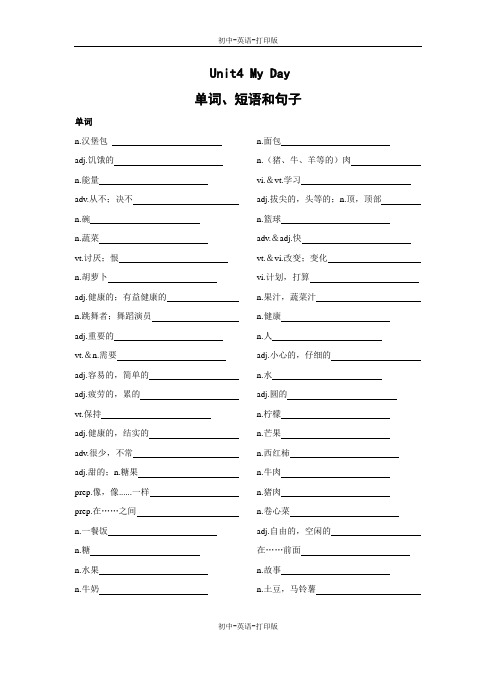
Unit4 My Day单词、短语和句子单词n.汉堡包adj.饥饿的n.能量adv.从不;决不n.碗n.蔬菜vt.讨厌;恨n.胡萝卜adj.健康的;有益健康的n.跳舞者;舞蹈演员adj.重要的vt.&n.需要adj.容易的,简单的adj.疲劳的,累的vt.保持adj.健康的,结实的adv.很少,不常adj.甜的;n.糖果prep.像,像......一样prep.在……之间n.一餐饭n.糖n.水果n.牛奶n.面包n.(猪、牛、羊等的)肉vi.&vt.学习adj.拔尖的,头等的;n.顶,顶部n.篮球adv.&adj.快vt.&vi.改变;变化vi.计划,打算n.果汁,蔬菜汁n.健康n.人adj.小心的,仔细的n.水adj.圆的n.柠檬n.芒果n.西红柿n.牛肉n.猪肉n.卷心菜adj.自由的,空闲的在……前面n.故事n.土豆,马铃薯n.(shelves)架子n.(knives)刀;餐刀n.绵羊n.小包;(一)包n.盐n.茶n.千克,公斤vt.买n.祖父;外祖父n.瓶子n.面条少于n.饼干n.分数;点vi.躺、卧;说谎vi.觉得,感到n.运气n.超级市场,超市vt.搬运,运输;携带n.花生n.汤prep.没有,不n.清单n.日常饮食n.零食n.可口可乐n.能量n.长沙发n.数量n.生活方式溜旱冰n.纸盒;牛奶盒;糖果盒int.哇,哇塞n.问卷n.祝贺n.搭档,合作伙伴adv.总体上说n.卡,拉里路(热量单位)n.维他命,维生素短语重点词组1. 想要成为一名舞蹈者_________________2. 变累______________________________3. 改变饮食___________________________4. 早饭吃一些面包____________________5. 一名顶尖学生_______________________6. 快餐______________________________7. 冰淇淋_____________________________8. 一点也不__________________________9. 吸收、摄取_________________________ 10.保持苗条_________________________ 11.每周两次_________________________ 12.计划做某事_________________________三、句型结构1. It’s important for a dancer to be healthy. (it 作为形式主语,用动词不定式作真正的主语)e.g. 1) 对于我们而言学好英语很必要。
牛津译林版七年级上册 Unit 4 My Day Reading A教案(表格式)
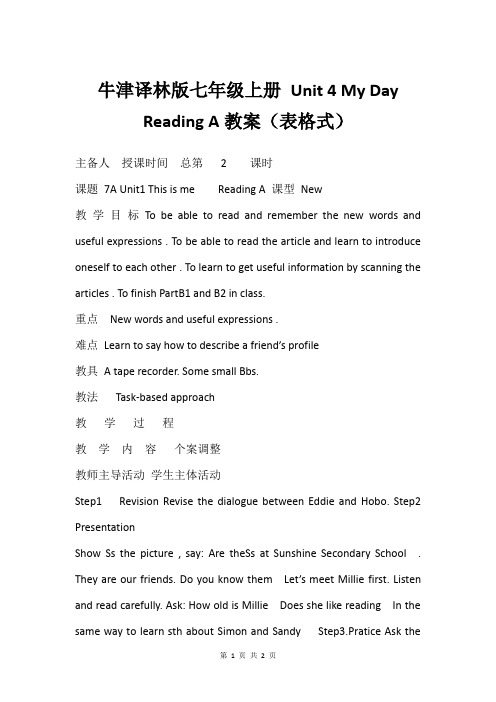
牛津译林版七年级上册Unit 4 My DayReading A教案(表格式)主备人授课时间总第 2 课时课题7A Unit1 This is me Reading A 课型New教学目标To be able to read and remember the new words and useful expressions . To be able to read the article and learn to introduce oneself to each other . To learn to get useful information by scanning the articles . To finish PartB1 and B2 in class.重点New words and useful expressions .难点Learn to say how to describe a friend’s profile教具A tape recorder. Some small Bbs.教法Task-based approach教学过程教学内容个案调整教师主导活动学生主体活动Step1 Revision Revise the dialogue between Eddie and Hobo. Step2 PresentationShow Ss the picture , say: Are theSs at Sunshine Secondary School . They are our friends. Do you know them Let’s meet Millie first. Listen and read carefully. Ask: How old is Millie Does she like reading In the same way to learn sth about Simon and Sandy Step3.Pratice Ask theSs to read again and finish Part B on Page 9 and Part C on Page 10. Ask: What activities do his Look and answer. Look and learn carefully. Answer the questions Think of the ercises.教学过程教学内容个案调整教师主导活动学生主体活动Step4.Discussion students like Please help him to put the correct letters in the box. 1.Ask the Ss to finish Part B2, discuss the answers with the Ss Step5 composition 2 Learn the language points. We know something about Millie ,Simon, Kitty, Amy, Sandy and Daniel now. Do you know more about them Let's do the following exercises. Step6 Homework Finish the exercises in the workbook. Revise the use of the Prep. in English. Do the exercises in the Part C1 do the test paper.板书设计7A Unit 1 Reading I Ⅰ.Words: Ⅰ.Notes: She is good at swimming . He likes playing computer games . He wears glasses .教学札记。
牛津译林版七年级英语上册《nit 4 My day Task: Are you happy.》赛课导学案_1
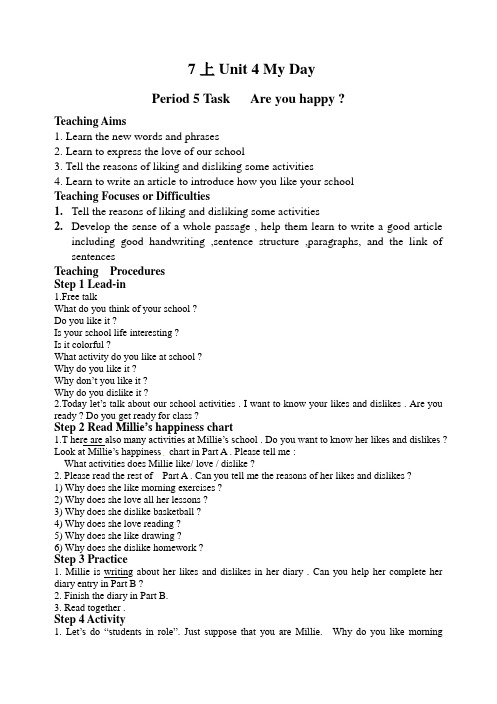
7上Unit 4 My DayPeriod 5 Task Are you happy ?Teaching Aims1. Learn the new words and phrases2. Learn to express the love of our school3. Tell the reasons of liking and disliking some activities4. Learn to write an article to introduce how you like your schoolTeaching Focuses or Difficulties1.Tell the reasons of liking and disliking some activities2.Develop the sense of a whole passage , help them learn to write a good articleincluding good handwriting ,sentence structure ,paragraphs, and the link of sentencesTeaching ProceduresStep 1 Lead-in1.Free talkWhat do you think of your school ?Do you like it ?Is your school life interesting ?Is it colorful ?What activity do you like at school ?Why do you like it ?Why don’t you like it ?Why do you dislike it ?2.Today let’s talk about our school activities . I want to know your likes and dislikes . Are you ready ? Do you get ready for class ?Step 2 Read Millie’s happiness chart1.T here are also many activities at Millie’s school . Do you want to know her likes and dislikes ? Look at Millie’s happiness chart in Part A . Please tell me :What activities does Millie like/ love / dislike ?2. Please read the rest of Part A . Can you tell me the reasons of her likes and dislikes ?1) Why does she like morning exercises ?2) Why does she love all her lessons ?3) Why does she dislike basketball ?4) Why does she love reading ?5) Why does she like drawing ?6) Why does she dislike homework ?Step 3 Practice1. Millie is writing about her likes and dislikes in her diary . Can you help her complete her diary entry in Part B ?2. Finish the diary in Part B.3. Read together .Step 4 Activity1. Let’s do “s tudent s in role”. Just suppose that you are Millie. Why do you like morningexercises ? Please give some other reasons .2. Ask Ss to express their opinions :1) I like morning exercises because they can make me strong .2) I love all my lessons because I can learn a lot in class .3) I dislike basketball because I cannot run very fast .4) I love reading because the books are very interesting .5) I like drawing because the colors are all very beautiful .6) I dislike homework because sometimes it is too difficult .Step 5 Writing1. Let’s read Millie’s diary .What does she write in the first paragraph ? (It’s about her loves .)What does she write in the second paragraph ? (It’s about her likes ).What is Paragraph Three about ? (It’s about her dislikes ).2.It’s your turn now . Can you design your won happiness chart ?What are your likes and dislikes ? Work in groups of four . Discuss your likes and dislikes with your classmates . You should also tell the reasons .3. OK . Try your best to write your own article . You can sue some useful expressions on page 52. You can also use Millie’s dairy entry as a mod el .4. Read your article to the class .HomeworkWrite an article about Tom’s happiness chartBlackboard WritingTeaching reflection。
牛津译林版英语七年级上册Unit4教案说课稿

2.过程与方法目标:
(1)通过小组合作,培养学生团队协作能力;
(2)通过任务型教学,激发学生的探究精神和自主学习能力;
(3)运用多媒体教学手段,提高学生的学习兴趣和积极性。
3.情感态度与价值观目标:
(1)培养学生热爱生活、珍惜时间的情感态度;
在学习本节课之前,学生已经掌握了基本的英语日常用语和一般现在时的用法。然而,可能存在以下学习障碍:
1.对一般现在时的运用不够熟练,容易与一般过去时混淆;
2.频率副词的使用不够准确,容易混淆不同频率副词的用法;
3.口语表达和听力理解能力有待提高,尤其在描述日常活动时。
(三)学习动机
为了激发学生的学习兴趣和动机,我将采取以下策略或活动:
(一)板书设计
我的板书设计将遵循清晰、简洁、有助于知识结构把握的原则。板书布局分为三个部分:左侧为标题和核心词汇,中间为主要知识点和例句,右侧为练习和活动提示。
1.板书主要内容:标题为“Unit 4 My day”,左侧列出本节课的核心词汇和短语,如:get up, go to school, have lunch等;中间部分展示一般现在时的基本结构和频率副词的用法,附以典型例句;右侧提示课堂练习和活动。
牛津译林版英语七年级上册Unit4教案说课稿
一、教材分析
(一)内容概述
本节课的教学内容选自牛津译林版英语七年级上册Unit 4 My day,是本册书的第四个单元。在整个课程体系中,本单元旨在帮助学生掌握日常生活中的基本英语表达,同时进一步巩固前三个单元所学的知识点。本单元的主要知识点包括:描述日常活动、表达时间、运用一般现在时描述习惯性动作、使用频率副词等。此外,通过学习本单元,学生能够提高自己的听说读写能力,为今后的英语学习打下坚实基础。
最新牛津译林版中学七年级英语上册《Unit 4 My day Grammar》教案
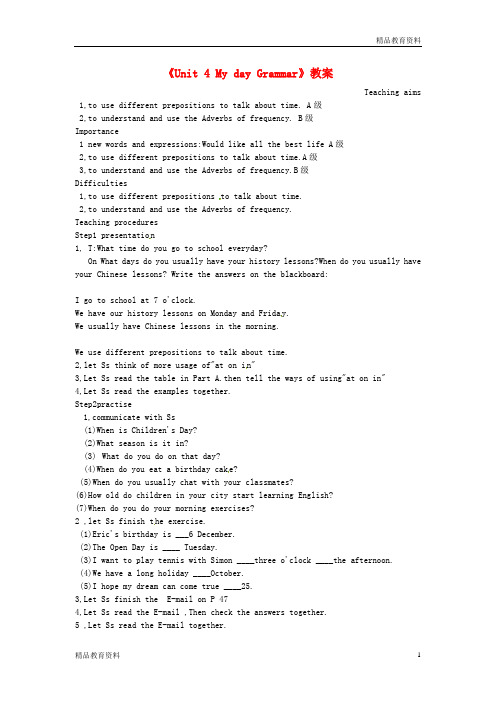
《Unit 4 My day Grammar》教案Teaching aims 1,to use different prepositions to talk about time. A级2,to understand and use the Adverbs of frequency. B级Importance1 new words and expressions:Would like all the best life A级2,to use different prepositions to talk about time.A级3,to understand and use the Adverbs of frequency.B级Difficulties1,to use different prepositions to talk about time.2,to understand and use the Adverbs of frequency.Teaching proceduresStep1 presentatio n1, T:What time do you go to school everyday?On What days do you usually have your history lessons?When do you usually have your Chinese lessons? Write the answers on the blackboard:I go to school at 7 o'clock.We have our history lessons on Monday and Frida y.We usually have Chinese lessons in the morning.We use different prepositions to talk about time.2,let Ss think of more usage of"at on i n"3,Let Ss read the table in Part A.then tell the ways of using"at on in"4,Let Ss read the examples together.Step2practise1,communicate with Ss(1)When is Children's Day?(2)What season is it in?(3) What do you do on that day?(4)When do you eat a birthday cak e?(5)When do you usually chat with your classmates?(6)How old do children in your city start learning English?(7)When do you do your morning exercises?2 ,let Ss finish t he exercise.(1)Eric's birthday is ___6 December.(2)The Open Day is ____ Tuesday.(3)I want to play tennis with Simon ____three o'clock ____the afternoon.(4)We have a long holiday ____October.(5)I hope my dream can come true ____25.3,Let Ss finish the E-mail on P 474,Let Ss read the E-mail ,Then check the answers together.5 ,Let Ss read the E-mail together.S tep3 presentation1 Communicate with SsT:Tommy and Millie often chat with each other on the internet.Do you often chat on the Internet?How often do you write e-mails?S:...T:Oh, you chat with your friends on the internet everyday.So you always chat with your friends...\T:Adverbs of frequency tell you how often things happen.2.Let Ss read the picture of Part B ,and work out the rul e:Always-usually-often-sometimes-seldom-neverStep4 practiceLet Ss finish the exercise on P 48Let Ss read it together .and remind them of the adverbs .Step5 ActivityI'll give you some minutes to prepare the conversation about your own day.You can talk about your school day and your daily activities.Pay attention to use the correct prepositions of time and adverbs of frequency.分层效果检测题必做题A层一、用on, in和at填空。
2023牛津译林版七年级上册Unit 4《My day》(Reading I)课件

After-school activities
Paragraph 2
When does Millie’s school start?
At eight in the morning.
They always chat with each other or play in the playground.
read books
do after-school activities
practise playing volleyball
chat with each other
have a good time
Which is Millie’s favourite subject?2. What does Millie like doing?
a lot of
chat
Reading CБайду номын сангаасub
Tuesday
Thursday
J: Does Millie like sports?T: Yes. She likes playing volleyball. She’s in the school _____________. They _______ after school on ___________________.
volleyball team
practise
Wednesday afternoon
Try to retell Millie’s day
Time
Events
8:00 a.m.
do morning exercises
Millie likes her school very much.
2. School starts at 8:15 at Millie’s school.
牛津译林版七年级英语上册《nit 4 My day Grammar: Prepositions of time . 》赛课导学案_13
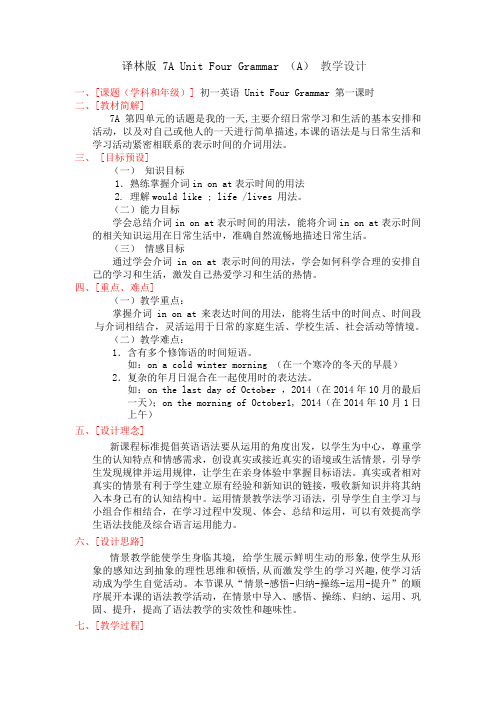
译林版 7A Unit Four Grammar (A)教学设计一、[课题(学科和年级)]初一英语 Unit Four Grammar 第一课时二、[教材简解]7A第四单元的话题是我的一天,主要介绍日常学习和生活的基本安排和活动,以及对自己或他人的一天进行简单描述,本课的语法是与日常生活和学习活动紧密相联系的表示时间的介词用法。
三、 [目标预设](一)知识目标1.熟练掌握介词in on at表示时间的用法2.理解would like ; life /lives 用法。
(二)能力目标学会总结介词in on at表示时间的用法,能将介词in on at表示时间的相关知识运用在日常生活中,准确自然流畅地描述日常生活。
(三)情感目标通过学会介词in on at表示时间的用法,学会如何科学合理的安排自己的学习和生活,激发自己热爱学习和生活的热情。
四、[重点、难点](一)教学重点:掌握介词in on at来表达时间的用法,能将生活中的时间点、时间段与介词相结合,灵活运用于日常的家庭生活、学校生活、社会活动等情境。
(二)教学难点:1.含有多个修饰语的时间短语。
如:on a cold winter morning (在一个寒冷的冬天的早晨)2.复杂的年月日混合在一起使用时的表达法。
如:on the last day of October ,2014(在2014年10月的最后一天);on the morning of October1, 2014(在2014年10月1日上午)五、[设计理念]新课程标准提倡英语语法要从运用的角度出发,以学生为中心,尊重学生的认知特点和情感需求,创设真实或接近真实的语境或生活情景,引导学生发现规律并运用规律,让学生在亲身体验中掌握目标语法。
真实或者相对真实的情景有利于学生建立原有经验和新知识的链接,吸收新知识并将其纳入本身已有的认知结构中。
运用情景教学法学习语法,引导学生自主学习与小组合作相结合,在学习过程中发现、体会、总结和运用,可以有效提高学生语法技能及综合语言运用能力。
牛津译林版七年级上册Unit 4《My day》(第1课时)教学设计
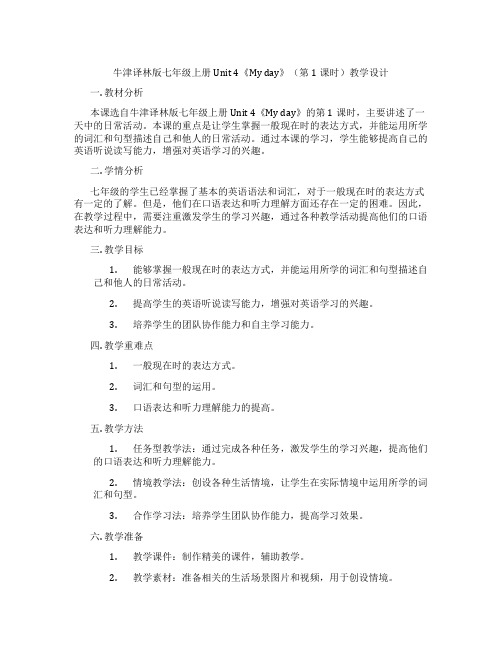
牛津译林版七年级上册Unit 4《My day》(第1课时)教学设计一. 教材分析本课选自牛津译林版七年级上册Unit 4《My day》的第1课时,主要讲述了一天中的日常活动。
本课的重点是让学生掌握一般现在时的表达方式,并能运用所学的词汇和句型描述自己和他人的日常活动。
通过本课的学习,学生能够提高自己的英语听说读写能力,增强对英语学习的兴趣。
二. 学情分析七年级的学生已经掌握了基本的英语语法和词汇,对于一般现在时的表达方式有一定的了解。
但是,他们在口语表达和听力理解方面还存在一定的困难。
因此,在教学过程中,需要注重激发学生的学习兴趣,通过各种教学活动提高他们的口语表达和听力理解能力。
三. 教学目标1.能够掌握一般现在时的表达方式,并能运用所学的词汇和句型描述自己和他人的日常活动。
2.提高学生的英语听说读写能力,增强对英语学习的兴趣。
3.培养学生的团队协作能力和自主学习能力。
四. 教学重难点1.一般现在时的表达方式。
2.词汇和句型的运用。
3.口语表达和听力理解能力的提高。
五. 教学方法1.任务型教学法:通过完成各种任务,激发学生的学习兴趣,提高他们的口语表达和听力理解能力。
2.情境教学法:创设各种生活情境,让学生在实际情境中运用所学的词汇和句型。
3.合作学习法:培养学生团队协作能力,提高学习效果。
六. 教学准备1.教学课件:制作精美的课件,辅助教学。
2.教学素材:准备相关的生活场景图片和视频,用于创设情境。
3.课堂练习:设计相关的练习题,巩固所学知识。
七. 教学过程1.导入(5分钟)利用图片和视频展示一天中的不同活动,引导学生谈论自己的日常活动。
2.呈现(10分钟)展示本课的主要词汇和句型,如:get up, go to school, have lunch等,并引导学生进行朗读和模仿。
3.操练(10分钟)分组进行角色扮演,让学生运用所学的词汇和句型描述自己和他人的一天。
4.巩固(10分钟)设计课堂练习,让学生完成相应的句子填空和对话编写任务。
牛津译林版英语七上Unit 4《My day》(task)教学设计

牛津译林版英语七上Unit 4《My day》(task)教学设计一. 教材分析牛津译林版英语七上Unit 4《My day》主要介绍了日常生活中的活动,通过学习本单元,学生可以掌握日常活动的表达方式,提高运用英语进行交流的能力。
本单元包括课文阅读、词汇学习、语法讲解和综合任务练习等内容。
其中,Task部分要求学生运用所学知识进行角色扮演,模拟真实生活场景,展示自己的日常生活。
二. 学情分析七年级的学生已具备一定的英语基础,能够进行简单的日常交流。
但部分学生对英语学习的兴趣不足,学习积极性有待提高。
此外,学生的英语水平参差不齐,有的学生发音准确,语法掌握较好,而有的学生则存在发音模糊、语法错误较多等问题。
因此,在教学过程中,教师需关注学生的个体差异,调动学生的学习兴趣,提高课堂参与度。
三. 教学目标1.知识目标:学生能够掌握描述日常活动的词汇和表达方式,如go toschool, have lunch, do homework等。
2.能力目标:学生能够用英语简单描述自己的日常生活,提高运用英语进行交流的能力。
3.情感目标:培养学生热爱生活、积极向上的态度,增强团队协作意识。
四. 教学重难点1.重点:描述日常活动的词汇和表达方式。
2.难点:运用所学知识进行角色扮演,模拟真实生活场景。
五. 教学方法1.任务型教学法:通过设定真实的生活场景,让学生在完成任务的过程中运用所学知识,提高实际运用能力。
2.情境教学法:创设生动、有趣的生活情境,激发学生的学习兴趣。
3.小组合作学习:鼓励学生相互交流、讨论,提高课堂参与度。
六. 教学准备1.教学课件:制作包含图片、动画等多媒体素材的课件,生动展示日常生活场景。
2.角色扮演道具:准备一些日常生活用品,如书包、餐具等,方便学生进行角色扮演。
3.教学资源:收集一些关于日常生活的英语视频或音频材料,用于拓展学习。
七. 教学过程1.导入(5分钟)利用多媒体展示不同日常活动的图片,引导学生用中文描述。
牛津译林版七年级英语上册《nit 4 My day Grammar: Prepositions of time . 》赛课导学案_8
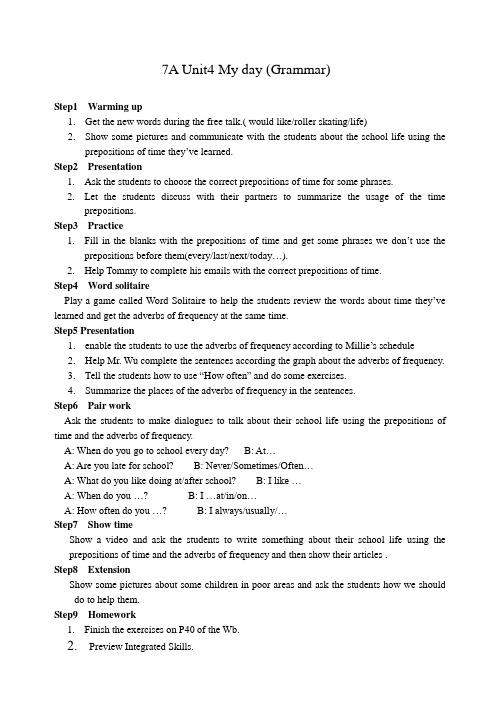
7A Unit4 My day (Grammar)Step1 Warming up1.Get the new words during the free talk.( would like/roller skating/life)2.Show some pictures and communicate with the students about the school life using theprepositions of time they’ve learned.Step2 Presentation1.Ask the students to choose the correct prepositions of time for some phrases.2.Let the students discuss with their partners to summarize the usage of the timeprepositions.Step3 Practice1.Fill in the blanks with the prepositions of time and get some phrases we don’t use theprepositions before them(every/last/next/today…).2.Help Tommy to complete his emails with the correct prepositions of time.Step4 Word solitairePlay a game called Word Solitaire to help the students review the words about time they’ve learned and get the adverbs of frequency at the same time.Step5 Presentation1.enable the students to use the adverbs of frequency according to Millie’s schedule2.Help Mr. Wu complete the sentences according the graph about the adverbs of frequency.3.Tell the students how to use “How often” and do some exercises.4.Summarize the places of the adverbs of frequency in the sentences.Step6 Pair workAsk the students to make dialogues to talk about their school life using the prepositions of time and the adverbs of frequency.A: When do you go to school every day? B: At…A: Are you late for school? B: Never/Sometimes/Often…A: What do you like doing at/after school? B: I like …A: When do you …?B: I …at/in/on…A: How often do you …?B: I always/usually/…Step7 Show timeShow a video and ask the students to write something about their school life using the prepositions of time and the adverbs of frequency and then show their articles .Step8 ExtensionShow some pictures about some children in poor areas and ask the students how we should do to help them.Step9 Homework1.Finish the exercises on P40 of the Wb.2.Preview Integrated Skills.3.。
牛津译林版七年级英语上册Unit 4 My day教案

牛津译林版七年级英语上册Unit 4 My day教案Comic strip and Welcome to the unit精品教案教材分析Comic strip &Welcome to the unit是本单元的第一课时,通过Eddie和Hobo 之间的对话,引出本单元的主题:我的一天。
通过Millie一天的日常活动安排来了解Millie的学校生活并与自己的进行比较。
教学目标:基础知识掌握词汇:wake , shall , hill , seldom, out , need , rest , just , after-school , activity , homework , usually , never , start 词组:wake up , go out , have breakfast / lunch / dinner , do homework , go to bed , be late for句型:I seldom go out . I always need a good rest . I’m never late for it .At a quarter past eight .基本技能1.介绍日常学习和生活的基本安排和活动;2. 对自己和他人的一天进行简单描述。
综合素质将自己的一天活动进行描述,从中学会合理安排时间并珍惜时间。
教学重难点及突破重点:介绍日常学习和生活的基本安排和活动;难点:对自己和他人的一天进行简单描述。
教学突破:将一天的校园活动制成表格,降低师生对话的难度。
教学准备教师准备:多媒体课件学生准备:预习本课时的内容。
教学设计Step I Lead-in (导入部分)1. Today we’ll lear n Unit 4 My day .Discuss in groups :How do you usually spend your day ?2. Present and learn the new words .Step II Presentation(新授部分)1.Listen and answer the questions: What does Eddie do every day ? What does Hobo think of dogs like Eddie ?2.Read after the tape .3.Help Ss understand the following phrases and sentences : 1)wake up 2) Is it time for breakfast ? 3)I seldom go out 4) I always need a good rest 5) Some dogs just don’t know how to have fun .4.Work in pairsStep III Present "Welcome to the unit" (新授Welcome to the unit)1.Look at the table of Millie’s day . Please answer my questions : What time does Millie get up ? What does Millie do at 7:00 a.m. every day ? I would like to go to school with Millie . What time can I meet her at her gate ? What does she do at 8:00 a.m. ? How many hours does Millie have lessons every day ? Does she go home at 4:00 p.m. ? What does she do ? What does she do after dinner ? What time does she go to bed ?2.Listen to the tape and answer : Is Millie often late for school ?3.Read after the tape4.Are your daily activities the same as Millie’s ? Complete the table on the right with your own information .5.Work in groups of four to discuss your own day . You can use Millie and her aunt’s conversation as a model .6.Each group chooses one student to give a report and introduce the daily activities ofthe group members .nguage points .Phrases : get up , have breakfast / lunch / dinner , have lessons , do after-school activities , do homework , go to bed Sentences : When do you go to school every day ? What time do you start lessons ?I’m never late for it . At a quarter past eight .随堂小练习I.根据首字母或中文提示完成单词。
- 1、下载文档前请自行甄别文档内容的完整性,平台不提供额外的编辑、内容补充、找答案等附加服务。
- 2、"仅部分预览"的文档,不可在线预览部分如存在完整性等问题,可反馈申请退款(可完整预览的文档不适用该条件!)。
- 3、如文档侵犯您的权益,请联系客服反馈,我们会尽快为您处理(人工客服工作时间:9:00-18:30)。
7A Unit 4 My Day Reading1导学案【教学目标】1.知识目标1) 词汇:本课时的四会单词2) 词组: chat with each other , twice a week , at lunchtime , have a good time3) 句型: I spend about two hours a day doing my homework.2.能力目标能够运用已学知识,描述自己的校园生活。
3.情感目标学会合理安排时间,热爱自己的校园生活。
【教学重点、难点】掌握并运用一些简单的句式描述自己的校园生活。
【课前准备】自学质疑一..生词library的意思是__________,它的复数名词是__________。
best的原级是_______和两个单词,他们的比较级是_______。
first的基数词是。
swimmer 的意思是_________它的动词应该是________。
二.解释下列词组的意思1. 学校生活_____________ _____2. 我最好的朋友________________3. 在午餐时_____________________4. 坐在操场上的树下_____________5. 相互聊天____________ _______6. 对我很好_____________________7. 花一小时做作业_______ ____ 8. 我最喜欢的课程________________9. 发电子邮件给我___ ________10. 游泳俱乐部的一个成员___________11. 每周二和周五__________ _____ 12. 玩得开心________________13. 喜欢打排球__________________ 14. 和他们一起训练_____________Part One While-readingStep 1T: Millie also wants to tell her school life to her new online friend Tommy. Read her e-mail then answer this question: Who is Millie’s best friend?S: Millie’s best friend is Amy.Step 2T:Millie is showing Amy her e-mail to Tommy but Amy does not know some of the words. Read the e-mail again, let’s help Amy match the words with the correct m eanings. ( Page 25 Part B2 )Step 3T:Amy advised Millie to send Tommy some pictures of different places in her school. Please write the correct words under the pictures. ( Page 25 Part B1 )Step 4T: Please read after the tape again and find out what each paragraph tells us.•Para. 1 My friends and I•Para. 2 My school and my class•Para. 3 After-school activities•Para. 4 School lessons and homeworkS:Para. 1 My friends and IPara. 2 My school and my classPara. 3 After-school activitiesPara. 4 School lessons and homeworkStep 5T:Read Paragraph 1 and answer the following questions.Is Millie’s school big or small?Which class is she in ?Why does she like her classroom?S: Her school is very big.She is in Class 1, Grade 7.Because it’s big and clean.T: Read Paragraph 2 and answer the questions.Where do they like to go at lunchtime?S: Playground.T: What do they always do in the playground at lunchtime?S: They always chat with each other or play games.她们经常相互交谈或做游戏。
T: Read Paragraph 3 and tell us what Millies favourite lessons are.S: Her favourite lessons are Chinese and English.T: How long does Millie spend doing her homework?S: She spends about two hours a day doing her homework.她每天花两个小时左右的时间做作业。
T: Read Paragraph 4 and complete the sentences..Millie goes to the school _________ every day.Millie practises _________ after school.Amy is a very good ________.Part Three Post-readingStep 6T: Tommy is now telling his friends about Milli e’s e-mail. Write a T if the sentence is true.Write an F if it is false. ( Page 26 Part C )Step 7 read the “Reading” after the tape.【要点点击】【达标检测】一..根据首字母填写单词.1. We a_______ have a good time at our school.2. Millie is a m______ of the Reading Club.3. My f_____ sport is badminton. I often p playing it .4. Every week we s______ three hours p________ speaking English.5.We have classes from M_____ to F______.We have no classes at w .6. She is in the Swimming Club. She is a very good s_______.二.翻译下列句子1. Millie和她的同学们在一起总是过的很愉快。
Millie always with her classmates.2. 我最好的朋友Amy总是和我一起在树下交谈或做游戏。
My Amy always or with me under the tree.3. 我每天花大约一个小时做作业。
I about an hour my homework every day.4. 他最喜欢的科目是语文和英语吗?____________________________________5. 她喜欢午餐时间因为她能和好朋友聊天。
___________________________________6. 到了做课外活动的时间了【教后感】【课后作业】一:翻译下列短语1. 在操场上____________________2.在午餐时间_________________3.互相交谈________________4.一天两小时_________________5.在2004年4月的下午_______________6. 对某人友好__________________7. 花一小时做作业_______ ____ 8. 练习弹钢琴_______________一、词汇A.根据汉语提示,写出正确的单词1. Amy enjoys (聊天)with her online friend at the weekends.2.We do not have an English lesson on (星期二).3---Are there any (图书馆)in your school?---Yes, there are two. One is big and (另一个)is small.4.My cousin with his family (去) to the Great Wall (一年两次). B.写出所给单词的正确形式5.Amy often (swim) in the swimming pool. She is a good (swim).6.She is always the (one) one to get to school.7.Lucy spends two hours (play) the piano every day.8.Simon draws (well) .He practices (draw) twice a week.三、单项选择( ) 1.I go to the Reading Club Saturdays or Sundays.A. inB. atC. onD. of( ) 2. Lucy and Lily spend about one hour every day.A. does her homeworkB. do their homeworkC. to do their homeworkD. doing their homework( ) 3. Would you like with me?A. playing the badminton B .playing badmintonC. to play the badminton d .to play badminton( ) 4. If you are reading in the library, .A. you can run and playB. you can write and draw on the books.C. you should keep quietD. you can chat with each other loudly四、按要求完成句子1. I like Chinese and English best.(同义句)2. She goes to the English Club twice a week.(画线提问)3 .She does morning exercises at 8:00 a.m.(画线提问)4.Miss L i (对我们很好了)5.They are all (我校足球队的成员)6. you (玩的开心)in the park? 7.(Jim花三天时间完成) the work.五、任务型阅读On school days, American students usually get up at 7:00. They usually eat eggs, toast (吐司) and a glass of milk for breakfast, Then they go to school. Nearly all the students walk to school or take a yellow school bus. Very few ride bikes. They start their classes at 8:30 or 9:00.At noon, students eat lunch at school. The usual lunch is meat, vegetables, fruit, bread. American children like sugar and after the meal they have a small piece of cake or cookie. They play or watch TV before supper. 晚饭后,他们做家庭作业。
